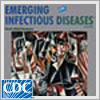Strategies for Fighting Pandemic Flu in Developing Countries
[Announcer] This podcast is presented by the Centers for Disease Control and Prevention. CDC — safer, healthier people.
[Ted Pestorius] Hello. I'm Ted Pestorius. I'm here with Dr. Dan Jernigan, Deputy Director of CDC's Influenza Division. Today, we're talking about a perspective paper by Dr. David Fedson in the March 2009 issue of the CDC's journal, Emerging Infectious Diseases. The article looks at how different countries are preparing for the next influenza pandemic and explores some of the difficulties developing countries may face when it occurs. So, Dr. Jernigan, why don't we start by explaining what type of preparations are going on now for the next pandemic, both here in the United States and abroad.
[Dan Jernigan] Well, we know that the impact of a pandemic will be catastrophic if it's similar to what we had in1918. In the United States, there’s been an unprecedented amount of preparation so far. It affects every aspect of public health. We have efforts for treatment, efforts for better prevention, clinical management, communications, domestic and international responses, and also efforts to try and prevent transmission within the community. The federal government has had a tremendous amount of resources that they have put into development of new antiviral drugs, antiviral drug stockpiles, development of new vaccines, and manufacturing facilities for vaccines. So there's quite a lot that has happened in the United States. However, developing countries do not have the level of resources found in more developed countries and that’s a real challenge.
[Ted Pestorius] What's going to make their preparations more challenging?
[Dan Jernigan] Well, there has been a lot of support that the U.S. federal government and other countries' governments have provided to developing countries but these countries are not able to have the antiviral stockpiles and vaccine stockpiles at the level that developed countries have. And developed countries should and are assisting with some support. However, these developing countries may need to prepare themselves with strategies that are most effective for the resources and infrastructure that are likely to be available to them during a pandemic.
[Ted Pestorius] And what type of strategies might work?
[Dan Jernigan] Well, there are a number of actions that can be taken. There are some simple measures like following appropriate hygiene to prevent transmission. But there's also the use of non-pharmacologic means for preventing transmission; by that I mean things that are not vaccine and things that are not the drugs. Those include social distancing - that is just staying away from each other and staying away from large events where people get together, use of simple face masks to serve as a barrier for droplet transmission, closing schools, and also early detection of pandemic cases for starting the community measures.
The authors suggest that a bottom-up strategy may help developing countries confront the next pandemic and that means the use of existing healthcare worker strategies and facilities, using inexpensive and widely available drugs to stop the pandemic from having its impact on the person. The authors actually suggest that you could use cholesterol-lowering drugs or anti-malarial drugs to change the way the host responds to the infection, rather than trying to kill the infection itself. So, some of these are cheap and available drugs and he recommends that we look into that as a potential alternative strategy and it's an innovative concept.
[Ted Pestorius] What would need to happen before an approach like that could be undertaken?
[Dan Jernigan] Well, it's important to remember that we don't know when the next pandemic will be. And we know that for the proposed approach that the author has that there is more testing that is needed to determine if some of these approaches might be useful during a pandemic. Even if we do that, it's difficult to say if what might work on current influenza strains would work with the strain that emerges as a pandemic strain. One important purpose for publishing articles like this month's piece by Dr. Fedson is that we should continue to think outside the box for new, innovative, and resource-appropriate ways for prevention, treatment, and response during a pandemic.
[Ted Pestorius] Thank you, Dr. Jernigan. We've been talking today about a paper that appears in the March 2009 issue of CDC's journal, Emerging Infectious Diseases. You can see the whole article online at www.cdc.gov/eid. If you'd like to comment on our podcast, please send a line to eideditor@cdc.gov. That's eideditor – one word - at cdc.gov. I'm Ted Pestorius, for Emerging Infectious Diseases. Thank you for listening and have a healthy day.
[Announcer] For the most accurate health information, visit www.cdc.gov or call 1-800-CDC-INFO, 24/7.



